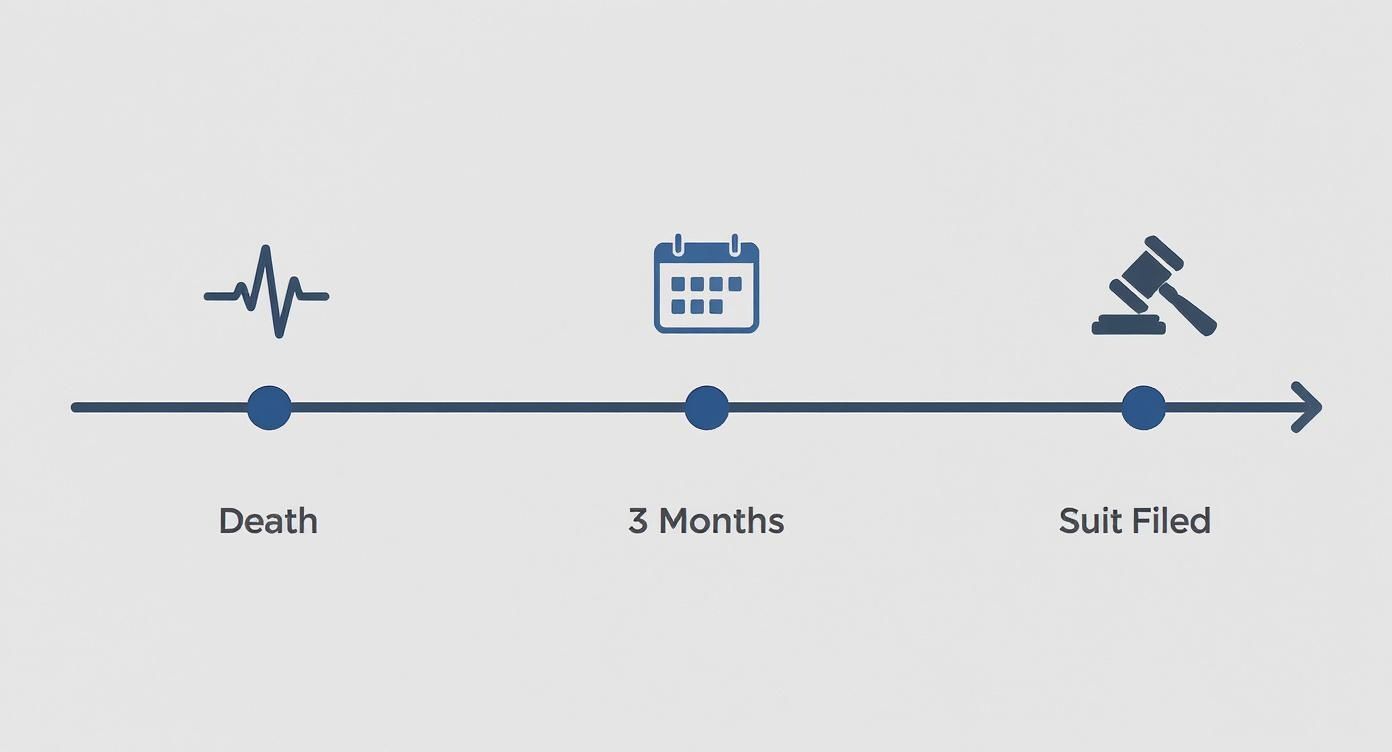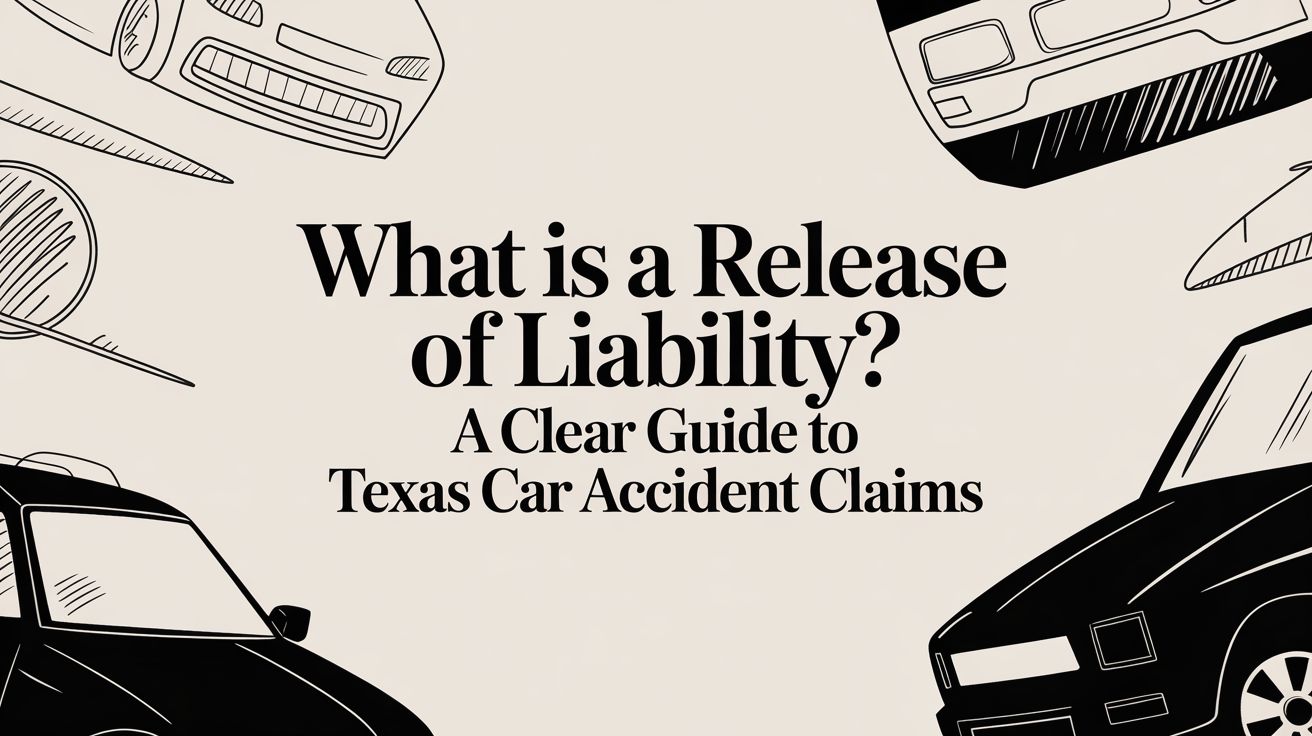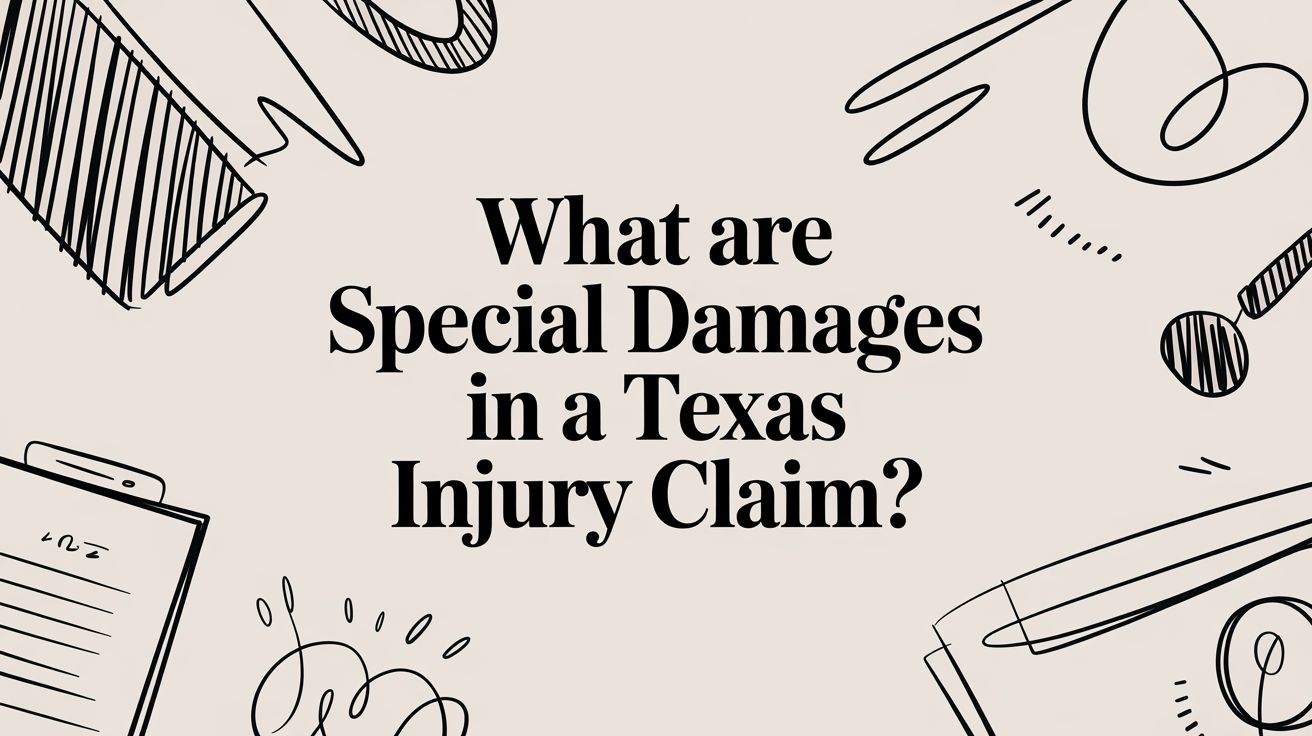Losing a family member in a preventable accident is a profound injustice, and the grief can be all-consuming. On top of that, you're suddenly facing a mountain of legal questions you never thought you'd have to ask. A serious accident can change your life in seconds — but you don’t have to face it alone. In Texas, it’s critical to know that the wrongful death statute of limitations is generally two years from the date of your loved one's passing. This deadline makes time a crucial factor in your family's fight for justice.
A Path Forward After a Devastating Loss

Losing a loved one because of someone else's carelessness is an unbearable weight, and the emotional and financial fallout can feel impossible to manage. You're not just coping with grief; you're also hit with unexpected expenses and a future that feels deeply uncertain. We understand what you're going through, and we want you to know that you have rights.
While no amount of money can ever bring your family member back, a wrongful death claim offers a legal path to hold the responsible party accountable. It’s a way to secure the financial stability your family needs to begin moving forward. This process isn't just about compensation; it's about getting justice for your loss and helping to ensure a similar tragedy doesn't tear another family apart.
Understanding Your Rights and Next Steps
Trying to navigate the legal system while you are grieving is incredibly difficult, which is why having clear answers and supportive guidance is so important. The single most critical factor to understand is the wrongful death statute of limitations in Texas. This is a strict legal deadline for filing a lawsuit. If you miss this window, your family could permanently lose its right to seek compensation.
For instance, imagine the family of a victim in a fatal Houston freeway crash. They have a limited time to take legal action against the negligent driver. It’s essential to realize that this deadline, combined with the need to gather evidence, makes seeking professional guidance a vital first step. The aftermath of a tragic event, like when a construction site accident turns fatal, often leaves families with more questions than answers about their legal options.
When you're grieving, legal deadlines are the last thing on your mind. But preserving evidence and meeting the statute of limitations are absolutely vital to protecting your family’s rights and securing the justice your loved one deserves.
While you focus on healing, a compassionate Texas wrongful death lawyer can take these pressures off your shoulders. As you navigate the complexities of a wrongful death claim, many people also look for ways to honor their loved one; finding unique sympathy gifts for the loss of a mother can provide a small measure of comfort during such a painful time. Here at The Law Office of Bryan Fagan, PLLC, our goal is to give you the knowledge and reassurance you need. We’re here to help you understand your rights and support you on the path to recovery.
How Long Do You Have to File a Wrongful Death Claim in Texas?

When you've lost a family member, the last thing on your mind is a legal deadline. Still, one of the most urgent questions is often about time—how long does your family have to seek justice? In Texas, the law provides a clear, but strict, answer. Understanding this timeframe is the first critical step in protecting your family’s rights.
The wrongful death statute of limitations in Texas is generally two years. This law creates a two-year window for your family to file a lawsuit against the person or company whose negligence caused your loved one’s death.
The Clock Starts on the Date of Passing
This is a crucial detail that often causes confusion. The two-year countdown does not begin when the accident happened. Instead, the legal clock starts ticking on the day your loved one actually passed away from their injuries.
For instance, say a family member was in a serious truck crash on a Houston highway in April. They fought for weeks in the hospital but tragically died in June. The two-year deadline for the family’s wrongful death claim would start in June, not back in April.
The single most important rule to remember is this: The two-year wrongful death statute of limitations in Texas starts on the date of your loved one's death, not the date of the incident that caused the fatal injury.
This legal time limit, called a statute of limitations, is in place to ensure legal disputes are handled while evidence is still fresh—witness memories haven't faded, and records are still available. But for a grieving family, those two years can fly by. If you miss this deadline, your case will almost certainly be dismissed. For a deeper look, you can learn more about how the legal clock starts ticking from the date of death.
Who Can File a Claim and When
Knowing the deadline is the first piece of the puzzle. The second is knowing who is legally allowed to take action. This table breaks down the essentials for a Texas wrongful death claim, offering a quick guide during a difficult time.
Texas Wrongful Death Claim at a Glance
| Element | Details |
|---|---|
| Standard Filing Deadline | Two years from the date of the deceased's death. |
| Who Can File the Claim | The surviving spouse, children (both biological and adopted), and parents of the deceased. |
| Filing as a Group | These family members can file the lawsuit together as a group or file their claims individually. |
| Three-Month Rule | If no eligible family members file a claim within the first three months after the death, the estate's personal representative may file on their behalf. |
Meeting this deadline is non-negotiable in most situations. If you let it pass, the court will almost certainly dismiss your case, and your family will lose the chance to hold the at-fault party accountable for their actions.
This is exactly why it’s so important to speak with an experienced Texas wrongful death lawyer as soon as you feel ready. A compassionate attorney can take over managing these critical deadlines, investigating the accident, and building a strong case while you focus on what truly matters—your family.
Who Has the Right to File a Wrongful Death Lawsuit in Texas?
When your family is grieving, the last thing on your mind should be navigating a complex legal system. But one of the first questions that needs an answer is: who has the legal standing to take action? In Texas, the law is very specific about which family members can file a wrongful death lawsuit and seek justice for their loved one.
This isn't just a legal formality. These rules are in place to ensure that the people most directly affected by the loss are the ones empowered to hold a negligent party accountable. Knowing who can file is a critical first step in protecting your family’s future.
Eligible Family Members Under Texas Law
The Texas Civil Practice and Remedies Code doesn't leave this open to interpretation. It reserves the right to file a wrongful death claim for a specific group of immediate family members:
- The surviving spouse of the deceased.
- The surviving children, which includes both biological and legally adopted children.
- The surviving parents of the deceased.
These individuals can decide to file a lawsuit together, or they are free to bring their claims separately. For instance, if a construction worker in San Antonio dies from a catastrophic injury on the job, his wife and adult children could join forces in a single lawsuit. On the other hand, his parents might choose to file their own separate claim.
The Three-Month Rule and Estate Representatives
Texas law also has a built-in safety net to make sure a claim can move forward, even when the family is understandably unable to act right away. For the first three months after the person's death, only the eligible spouse, children, or parents have the right to file a lawsuit.
However, if none of these family members have filed a claim within that initial three-month window, the law then allows the personal representative or executor of the deceased’s estate to step in and file. When this happens, the representative is acting on behalf of all the eligible beneficiaries.
This rule provides a crucial pathway to justice. It ensures that the opportunity to hold a negligent party accountable isn’t lost just because a grieving family isn't ready or able to initiate legal proceedings themselves.
Imagine a young mother in Dallas is killed in a horrific truck accident, leaving behind a husband and two young children. Her husband is completely overwhelmed, trying to manage his own grief while caring for their kids. If he doesn’t file a lawsuit within three months, the executor named in his wife’s will can initiate the wrongful death claim for the benefit of both him and the children.
This structure ensures that while the right to file is limited, there are clear avenues for families to seek the compensation they deserve. Understanding who can act—and when—is vital, especially with the clock always ticking on the wrongful death statute of limitations in Texas. An experienced Houston wrongful death lawyer can bring clarity to this process, helping your family understand its rights and ensuring every legal requirement is met with compassion.
Are There Exceptions to the Two-Year Filing Deadline?
While Texas law sets a firm two-year statute of limitations for most wrongful death claims, it also recognizes that life isn’t always that simple. Certain situations can make it impossible—or simply unfair—for a family to file a lawsuit on time.
In these specific circumstances, the legal clock can be “tolled,” which is a legal term for pausing or delaying the deadline. It’s the law’s way of ensuring fairness. Understanding these exceptions is critical, as they can reopen a path to justice that might have seemed closed for good.
This timeline gives you a general idea of how a claim progresses, but as we’ll see, that starting point isn't set in stone.

The key takeaway from this visual isn't just the two-year window, but the fact that certain exceptions can completely change when that clock officially starts ticking for your family.
When a Minor Child Loses a Parent
One of the most significant exceptions involves minor children. When a child under the age of 18 loses a parent due to someone's negligence, the emotional devastation is compounded by the fact that they are legally unable to file a lawsuit on their own.
Texas law accounts for this vulnerability by tolling the statute of limitations. For a minor’s wrongful death claim, the two-year clock does not start running until they turn 18. This means they have until their 20th birthday to file a lawsuit.
However, the child doesn't have to wait until they are an adult. A surviving parent or a court-appointed guardian can—and often should—file a claim on the minor’s behalf long before they turn 18. Acting sooner helps preserve crucial evidence and can secure financial support for the child’s upbringing when they need it most.
The Discovery Rule: When Negligence is Hidden
Another critical exception is the Discovery Rule. This rule applies in those rare but devastating situations where the true cause of a loved one's death wasn't immediately apparent or, worse, was actively hidden from the family.
In these cases, the two-year statute of limitations doesn’t begin on the date of death. Instead, it starts on the date the family knew, or reasonably should have known, that negligence was the real cause.
The Discovery Rule ensures that families aren’t punished when the truth is concealed. Justice shouldn’t have an expiration date when the facts were intentionally or negligently kept from those who are grieving.
Consider this tragic real-world example: A patient dies following what was described as a "routine" surgery at a Dallas hospital, and the family is told it was an unavoidable complication. Three years later, a whistleblower reveals the surgeon was impaired during the procedure and the hospital covered it up. Under the Discovery Rule, the family's two-year clock to file a wrongful death lawsuit would start from the day they discovered this hidden negligence, not the day their loved one passed away.
Other Important Exceptions
A few other specific circumstances can also pause the statute of limitations clock:
- Fraudulent Concealment: If the at-fault party takes active steps to hide their involvement or wrongdoing, the clock won’t start until that fraud is uncovered.
- Mental or Physical Incapacity: If the surviving family member who would file the claim was mentally or physically incapacitated when their loved one died (perhaps they were injured in the same car wreck), the deadline is often paused until they have recovered.
Proving these exceptions can be legally complex and requires a deep understanding of Texas case law. If you believe one of these situations applies to your family, it is absolutely essential to speak with an experienced Texas personal injury lawyer. They can investigate the unique facts of your case and determine if you still have time to protect your legal rights.
What Compensation Can Your Family Recover?

While no amount of money can ever truly make up for the person you've lost, a wrongful death lawsuit serves two critical purposes. First, it holds the negligent party accountable for their actions. Second, it provides the financial stability your family needs to move forward without the person you depended on.
Understanding the types of compensation—or "damages"—available can help you see a path through this incredibly difficult time. In Texas, these damages fall into two main categories: economic damages, which cover concrete financial losses, and non-economic damages, which address the profound emotional cost of your loss.
Economic Damages: Tangible Financial Losses
Economic damages are the straightforward, calculable financial losses your family has suffered because of your loved one's death. The goal here is to replace the financial support and contributions your family would have received if your loved one had lived a full life.
This typically includes:
- Lost Earning Capacity: This isn't just about the last paycheck. It's a calculation of the income your loved one would have likely earned over their entire career and contributed to the family.
- Loss of Inheritance: This accounts for the value of the assets, savings, or property your family would have eventually inherited.
- Lost Household Services: Think about all the things your loved one did around the house—childcare, home repairs, managing finances. This damage category assigns a monetary value to those essential contributions.
For example, if a Houston construction worker was the main breadwinner for his family, a wrongful death claim would aim to recover his projected lifetime earnings to support his spouse and children.
Non-Economic Damages: The Human Cost of Your Loss
Non-economic damages are meant to compensate for the immense, intangible losses that don’t come with a price tag. These are often the most significant part of a wrongful death claim because they acknowledge the deep, personal impact of the tragedy.
Your family's suffering is real, and Texas law recognizes that. Non-economic damages address the profound emotional pain and loss of companionship that can never be measured but must be acknowledged.
This type of compensation covers:
- Mental Anguish: This addresses the grief, sorrow, and emotional trauma that surviving family members endure.
- Loss of Companionship and Society: This compensates for the loss of your loved one’s presence, guidance, love, and support in your daily life.
- Loss of Consortium: This is a specific claim for a surviving spouse, covering the loss of intimacy, affection, and partnership in the marriage.
What Is a Survival Action?
In addition to your family's wrongful death claim, Texas law provides for a separate but related claim called a survival action. This isn't brought by the family members directly; it's filed on behalf of the deceased's estate.
The purpose of a survival action is to recover damages that your loved one could have claimed themselves if they had survived the accident. Think of it as their personal injury claim that "survives" their death. This action covers the conscious pain and suffering your loved one experienced between the moment of injury and their passing, as well as any medical bills and lost wages they incurred during that time.
Understanding these different types of compensation is a critical first step. A skilled wrongful death lawyer Texas can help you calculate the full scope of your family's losses, ensuring that any settlement or verdict truly reflects everything you have endured. While the wrongful death statute of limitations in Texas sets a strict deadline, we are here to help you navigate every part of this process with compassion and strength.
Practical Advice: Steps to Protect Your Family's Rights
In the midst of grieving, the thought of taking legal action can feel completely overwhelming. But taking a few practical steps right now can make a huge difference in protecting your family’s right to seek justice down the road. These actions help preserve crucial evidence and ensure you don't accidentally weaken your family's ability to file a claim before the wrongful death statute of limitations in Texas runs out.
Taking control of these first few tasks can give you a sense of purpose during a time that feels chaotic. It’s all about building a solid foundation for your case, so when you’re ready, everything is in place to hold the negligent party accountable.
Start Gathering Important Documents
While your legal team will handle the heavy lifting of building a case, getting key documents together early on is incredibly helpful. This paperwork forms the factual backbone of any wrongful death claim.
Start by getting copies of:
- The Official Death Certificate: This is an essential document. It formally records the date of death, which officially starts the clock on the two-year statute of limitations.
- Accident or Police Reports: If the death was caused by a car wreck, workplace incident, or other event, the official report contains vital details, witness information, and the officer’s initial findings on what happened.
- Medical Records: Gather any hospital or medical bills related to the final injury or illness.
- Financial Documents: Documents like pay stubs, tax returns, and other proof of income will be absolutely critical for calculating your family's lost financial support.
Beyond just the statute of limitations, managing all the necessary paperwork is a key part of protecting your family's interests. For instance, knowing the process for handling documents after car accidents, which can tragically lead to wrongful death claims, is important.
How to Handle Insurance Companies
It is absolutely critical that you do not speak with the at-fault party's insurance company before you've talked to an attorney. Insurance adjusters are trained professionals whose job is to protect their company's bottom line, which means paying out as little as possible. They might try to record your conversation to use your words against you later or offer a quick, lowball settlement that doesn't come close to covering your family's true losses.
Politely refuse to give a statement and simply tell them your attorney will be in touch. This one simple step protects you from being pressured into an unfair deal while you are at your most vulnerable.
Your focus should be on your family, not on debating with an insurance company. Let an experienced Texas wrongful death lawyer handle all those communications for you.
When to Call a Lawyer
The single most important step you can take is to contact a compassionate and experienced wrongful death attorney as soon as you possibly can. That two-year deadline can fly by, and building a strong case takes time. Your lawyer needs to investigate what happened, gather evidence, track down and interview witnesses, and hire experts before evidence starts to disappear or memories fade.
An attorney will manage all deadlines, handle the complex paperwork, and act as a shield between you and the insurance companies. They also provide guidance and support, giving your family the space you need to grieve. To learn more about what to look for, you can find some great advice on how to choose a personal injury lawyer who is the right fit for your family.
Common Questions About Texas Wrongful Death Claims
Losing a loved one is a devastating experience, and navigating the legal system on top of that grief can feel overwhelming. To help bring some clarity during this difficult time, we've answered some of the questions we hear most often from families considering a wrongful death claim in Texas.
What if My Loved One Was Partially at Fault?
This is a really common and understandable worry. Texas law operates under a rule called modified comparative fault, sometimes called the 51% bar rule. In simple terms, this means your family can still seek compensation as long as your loved one was 50% or less at fault for the incident that led to their death.
If they were found to be 51% or more responsible, Texas law unfortunately prevents your family from recovering any compensation. If they were partially at fault (for example, 10%), any compensation your family receives will be reduced by that percentage. An experienced lawyer can protect you from unfair blame being placed on your loved one.
How Much Does a Wrongful Death Lawyer Cost?
Concerns about the cost of a lawyer should never be a barrier to seeking justice. Like most reputable personal injury firms in Texas, we handle wrongful death cases on a contingency fee basis.
A contingency fee arrangement means you pay zero upfront legal fees. Our firm covers all the costs of building your case. We only get paid if we successfully recover compensation for your family. If we don’t win your case, you owe us nothing.
This approach ensures that every family, regardless of their financial situation, has access to experienced legal help without taking on any financial risk.
Wrongful Death Claim vs. Survival Action: What's the Difference?
It's easy to get these two types of legal actions confused, but they serve very different purposes under Texas law.
- A wrongful death claim is filed by immediate family members (the spouse, children, or parents) to compensate them for their own personal losses. This includes things like lost financial support, the emotional pain of their loss, and the loss of companionship.
- A survival action, on the other hand, is brought by the deceased person's estate. It's meant to recover damages the loved one could have claimed themselves had they survived. This covers their conscious pain and suffering before death, medical bills, and any wages they lost between the time of the injury and their passing.
How Long Will a Lawsuit Take?
There’s no simple answer, as the timeline for a wrongful death lawsuit can vary dramatically. A more straightforward case that settles without going to court might be resolved in less than a year.
However, a complex case involving a truck crash lawyer Houston is handling or a disputed workplace accident could take several years to resolve, especially if it proceeds to a trial. The process of gathering evidence, deposing witnesses, and negotiating with insurance companies all impact the timeline. An experienced attorney can give you a more realistic estimate after reviewing the specifics of your case, much like they would when you learn how to file a car accident claim and get a sense of the road ahead.
At The Law Office of Bryan Fagan, PLLC, we know you are going through an unimaginable time. You don't have to face this journey alone. Our compassionate wrongful death attorneys are here to answer all your questions, protect your family's rights, and fight for the justice your loved one deserves. We want you to know that recovery is possible, and legal help is available. Schedule a free, no-obligation consultation today to learn how we can help. Your fight for justice is our fight, too. Contact us now at https://texaspersonalinjury.net.








